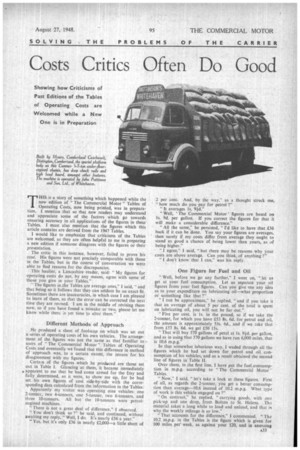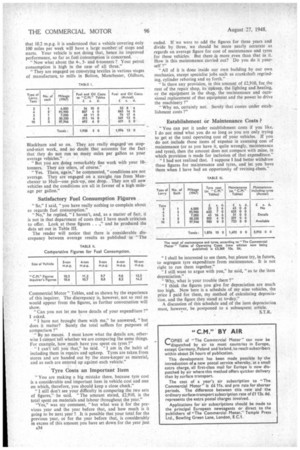Costs Critics Often Do Good
Page 51

Page 52

If you've noticed an error in this article please click here to report it so we can fix it.
Showing how Criticisms of Past Editions of the Tables of Operating Costs are Welcomed while a New
One is in Preparation
THIS is a story of something which happened while the new edition of "The Commercial Motor" Tables of Operating Costs, now being printed, was in preparation. I mention that so that new readers may understand and appreciate some of the factors which go towards ensuring accuracy in all applications of the figures in these Tables. I must also mention that the figures which this article contains are derived from the 1947 Tables.
I would like to emphasize that criticisms of the Tables are welcomed, as they are often helpful to me in preparing a new edition if someone disagrees with the figures or their presentation.
The critic in this instance, however, failed to prove his case. His figures were not precisely comparable with those in the Tables, but in the course of conversation we were able to find reasons for the discrepancies.
This haulier, a Lancashire reader, said: " My figures for operating costs do not, by any means, agree with some of those you give in your Tables."
'The figures in the Tables are average ones," I said, " and that being so it follows that they can seldom be an exact fit. Sometimes there are inaccuracies, in which case I am pleased to learn of them, so that the error can be corrected the next time they are revised. I am in the middle of revising them now, so if you have found a mistake or two, please let me. know while there, is yet time to alter them."
Different Methods of Approach
He produced a sheet of foolscap on which was set out a series of operating costs of his own vehicles. The arrangement of the figures was not the same as that familiar to users of "The Commercial Motor" Tables of Operating Costs and eventually we found that this difference in method of approach was, to a certain extent, the reason for his disagreement with my figures.
Certain of the figures which he produced are those set out in Table I. Glancing at them, it became immediately • apparent to me that he had come armed for the fray and fully determined, as it were, to show me up, for he had set his own figures of cost side-by-side with the corresponding data calculated from the information in the Tables: Apparently my visitor was operating nine vehicles: one 2-tonner, two 4-tonners, one 5-tonner, two 6-tonners. and three 10-tonners. All but the 10-tormers were petrolengined machines.
"There is not a great deal of difference." I observed.
" You don't think so ?" he said, and continued, without awaiting my reply, "Well, I do. It's nearly £36 a year." "Yes, but it's only £36 in nearly £2,000—a little short of 2 per cent. And, by the way," as a thought struck me. " how much do you pay for petrol ?"
"It averages Is. 90." " Well, The Commercial Motor' figures are based on Is, 9d. per gallon. If you correct the figures for that it will make a considerable difference."
"All the same," he persisted, "I'd like to have that £36 back if it can be done. You say your figures are averages, then surely if my costs differ from average they ought to stand as good a chance of being lower than yours, as of being higher."
"I agree," I said, "but there may be reasons why your costs are above average. Can you think, of anything ?" "I don't know that 1 can," was his reply.
One Figure for Fuel and Oil "Well, before we go any further," I went on, "let us get at your fuel consumption. Let us separate your oil figures from your fuel figures. Can you give ,me any idea as to your expenditure on lubricating oil—what proportion or something like that ?"
" I can be approximate," he replied, "and if you take it that an average of about 5 per cent. of the total is spent on lubricating oil, you will not be far out."
"Five per cent. is Is. in the pound, so if we take the 2-tonner, for which you have £53 Ss. 6d. for petrol and oil, the amount is approximately 53s. 6d., and if we take that from £53 Ss. 6d. we get £50 15s.
"That will buy 570 gallons of petol at Is. 90. per gallon, and as in using that 570 gallons we have run 6,000 miles, that is 10.6 m.p.g." In that somewhat laborious way, I waded through all the figures which he had set down for petrol and oil consumption of his vehicles, and as a result obtained the second line of figures in Table II.
Over them, in the first line, I have put the fuel .consumption in m.p.g. according to "The Commercial Motor ' Tables.
"Now," I said, "let's take a look at these figures. First of all, as regards the 2-tonner, you get a better consumption than average-10.6 instead of 10.2 m.p.g. What type of work is this vehicle engaged on ?"
"On contract," he replied. "carrying goods, with one pick-up and one drop, from Bolton to St. Helens. The material takes a long while to load and unload, and that is why the weekly mileage is so low."
"That accounts for the difference," I commented. "The 10.2 m.p.g. in the Tables is the figure which is given for 100 miles per' week, as against your 120, and in assessing A33 that 10.2 m.p.g. it is understood that a vehicle covering only 100 miles per week will have a large number of stops and starts. Your vehicle is not doing that, hence its improved performance, so far as fuel consumption is concerned.
"Now what about the 4-, 5and 6-tonners ? Your petrol consumption is high in the case of all three."
"They are engaged on conveying textiles in various stages of manufacture.. to mills in Bolton, Manchester, Oldham,
Blackburn and so on. They are really engaged -on stopand-start work, and no doubt that accounts for the fact. that they do not run so many miles per gallon as your average vehicles."
"But you .are doing remarkably fine work with your 10tonners. They are oilers, of course."
"Yes. There, again," he commented, "conditions are not average. They are engaged on a straight run from Manchester to Hull—one pick-up, one drop. They are all new vehicles and the conditions are all in favour of a high mileage per gallon."
Satisfactory Fuel Consumption Figures "So," I said, "you have really nothing to complain about as regards fuel consumption."
"No," he replied, "1 haven't, and, as a matter of fact, it is not in that department of costs that I have much criticism to offer. Look at these figures . . .," and he produced the data set out in Table III.
The reader will notice that there is considerable discrepancy between average results as published in "The Commercial Motor" Tables, and as shown by the experience of this inquirer. The discrepancy is, however, not so real as would appear from the figures, as further conversation will show.
Can you not let me have details of your expenditure ?"
I asked.
"I have not brought them with me." he answered, "but does it matter? Surely the total suffices for purposes of comparison ?"
" By no means. J must know what the details are, otherwise I cannot tell whether we are comparing the same things. For example, how much have you spent on tyres ?"
I can't tell you that," he said. "I am in the habit of including them in repairs and upkeep. Tyres are taken from stores and are handed out by the store-keeper as material, and as such are entered up against each vehicle."
Tyre Costs an Important Item
"You are making a big mistake there, because tyre cost is a considerable and important item in vehicle cost and one on which, therefore, you should keep a close check."
"1 still don't see your difficulty in comparing the two sets of figures," he said. "The amount stated, £2,910, is the total spent on materials and labour throughout the year."
"Yes," was my comment, "but what was it for the previous year and the year before that, and how much is it going to be next year ?. It is possible that your total for the previous year, or for the year before that, is considerably in excess of this amount you have set down for the year just *34 ended. If we were to add the figures for three years and divide by three, we should be more nearly accurate as regards an average figure for cost of maintenance and tyres for these vehicles. But there is more even than that in it. How is this maintenance carried out? Do you do it yourself ?"
"All of it is done inside our own building by our own mechanics, except specialist jobs such as crankshaft regrinding, cylinder reboring and so forth."
" Is there any provision, in this amount of £2.910, for the rent of the repair shop, its upkeep, the lighting and-heating, or the equipment in the shop, the maintenance and occasional replacement of that equipment and the power to drive the machinery ?" " Why no, certainly not. Surely that comes under establishment costs ?"
Establishment or Maintenance Costs ?
" Your can put it under establishment costs if you like.
I do not mind what you do so long as you are only trying to get at the total operating cost of your vehicles. If you do not include those items of expense in assessing cost of maintenance (or as you have it, quite wrongly, maintenance and tyres), then the amount does not compare with mine, in which provision is made for inclusion of that expenditure." "I had not realized that. I suppose I had better withdraw these figures for maintenance and tyres, and let you have them when I have had an opportunity of revising .them."
"I shall be interested to see them, but please try, in future, to segregate tyre expenditure from maintenance. It is not right to run them together."
" I still want to argue with you," he said, "as to the item depreciation."
"Why, what is your trouble there ?"
"I think the figures you give for depreciation are much too high. Now here is a schedule of my nine vehicles, the price I paid for them, my method of calculating depreciation, and the figure they stand at to-day."
A discussion of this schedule and of the item depreciation must, however, be postponed to a subsequent article. S.T.R.




















































































